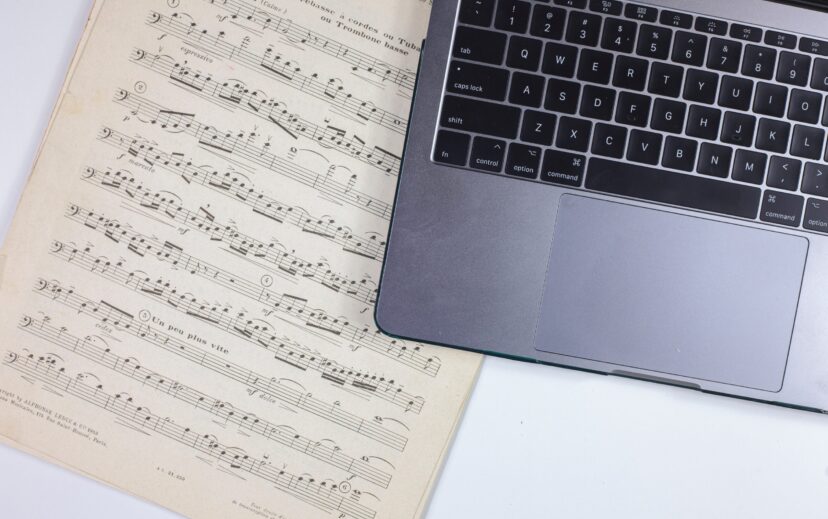Many might wonder why songwriters, recording artists, and other creative people should register their works with the U.S. Copyright Office. After all, under the current Copyright Act, registration with the Copyright Office is not required to obtain a copyright in a work.
Under Section 102(a) “[c]opyright protection subsists, in accordance with this title, in original works of authorship fixed in any tangible medium of expression, now known or later developed….” So, depending upon how you write your music, as soon as you put the pencil down, hit save on your computer or print out the music from your notation program, you have a copyright. Section 408(a) states that registration is permissive rather than mandatory. And registration can be costly, as the current fee to register works online is $45.00 to $65.00. That can add up if you create a lot of new music (or other copyrightable works). So, you may ask, “why should I bother to register?”
After all, you can get what is sometimes called a “poor man’s copyright registration” by mailing a copy of your work to yourself so that the postmark would demonstrate when you created the work. And identifying your work as “© 2022 Jane Doe, all rights reserved” is always advisable to put people on notice, whether or not you also register with the Copyright Office. Moreover, copyright registration is not required to register your works with a performing rights organization (PRO) such as ASCAP or BMI. While this is true and it’s essential for songwriters and composers to register their works with a PRO (and for recording artists to register with SoundExchange) in order to get paid for public performances of their works, there are some very powerful incentives built into the Copyright Act as to why you should also register your works with the Copyright Office.
- Copyright Registration Provides Evidence of the Work and When It Was Created
First, a copyright registration is the best evidence for what you wrote and when you wrote it. The Copyright Office has published a bunch of “circulars” (i.e., pamphlets) online which explain various aspects of copyright law in plain English. As explained in Circular 2, a copyright registration consists of the application, the fee and the “deposit copy,” which is a copy of the work that’s being registered. Under Section 410(c), “[i]n any judicial proceedings the certificate of a registration made before or within five years after first publication of the work shall constitute prima facie evidence of the validity of the copyright and of the facts stated in the certificate.”
In plain English, the registration provides evidence of what was registered, when it was registered, who created the work and who owns the work, as all that information is contained in the application and then put into the registration. And the deposit copy is proof of what was registered. Your self-mailed copy of your music doesn’t have that evidentiary weight in court, and what happens if you have to open the envelope to prove your case? Unless you mail multiple copies to yourself you won’t be able to do that trick again.
- Registration is Needed to File a Copyright Infringement Claim
Second, copyright registration is a prerequisite to filing a lawsuit. Section 411 states that you can’t file a copyright infringement action unless you’ve registered the work you want to sue over. That’s a pretty powerful incentive to register your works. And a 2019 decision from the Supreme Court held that you actually have to have a completed registration, certificate in hand and not merely an application pending in order to be able to file a lawsuit. As a practical matter, without a registration you have a right (a copyright) without a remedy. For example, if a client claims that someone infringed upon their song, the first thing an attorney should ask is whether they registered their composition with the Copyright Office. This is so the attorney can send a demand letter to the allegedly infringing party. If the infringing party checks the Copyright Office records online for a registration (and all copyright registrations since 1978 are available online) and they don’t find one for the work, they know that they cannot be sued. This lowers the negotiating leverage. Without the ultimate ability to sue, the likelihood of negotiating a favorable settlement (i.e., making the infringer stop and pay damages of a lot of money for past infringements) is limited.
If one does sue for copyright infringement, the copyright owner has a duty to prove that he or she is the rightful owner. However, registration shows the validity of the copyright, and courts have held that registration before or within 5 years of publication of a work establishes prima facie evidence of the validity of the copyright, establishing a presumption of ownership. In other words, a timely registration shifts the burden of proof of ownership to the party who is challenging it.
- Maximizing Infringement Remedies
Third, certain remedies under the Copyright Act are unavailable unless you register your work prior to the infringement taking place. How do you know when someone will infringe on your work? You don’t. This is another powerful incentive for folks to voluntarily register. As to what you’re giving up, if you didn’t register prior to being infringed upon, Section 412 states you can’t get “statutory” damages under Section 504(c) and you can’t get the infringer to pay your attorney’s fees under Section 505. Statutory damages are those assessed by the Court which can range between $750 and $30,000 per infringement and up to $150,000 if the infringement is deemed to be “willful” (i.e., really, really bad). Statutory damages are available because “actual damages” (losses suffered by the plaintiff and profits made by the defendant) are often difficult — and expensive — to prove. Further, sometimes actual damages are relatively modest so without the prospect of statutory damages it isn’t cost-effective to pursue a claim. And copyright infringement actions are very expensive. They can run tens of thousands of dollars if the case is resolved prior to trial, and hundreds of thousands of dollars – or more – if the case goes to trial and then is appealed. Having an infringer face the prospect of many thousands of dollars per infringement, plus having to pay the winning party attorney’s fees, is a very powerful inducement to pre-litigation settlement.
- Copyright Registration is Simple
Fourth, registration is easy. For most registrations, particularly if your work is “unpublished” (and when you first complete writing your music, whether it’s just in notation or in recorded form, it’s unpublished), you can complete the application, including uploading digital files of your deposit copies, online. While it is not generally recommended that individuals try to do a trademark registration on their own, attorneys frequently recommend that individuals do their own copyright registrations, as the process is much simpler and involves fewer legalities and technicalities than trademark registrations.
- Copyright Registration is Inexpensive
Fifth, it’s cheap. While $45 – $65 per registration can add up quickly if you write a lot of songs (or create a lot of other works), in many instances you can register multiple works under a single application. In addition, there are circumstances where, for example, you can register both an underlying musical work and the master recording of that work in a single application. For general rules regarding the registration of multiple works in a single application, see Circular 34. With respect to registering musical compositions, including questions about the difference between a registration of the music and the registration of the recording, as well as guidelines regarding deposit copies and when you can register multiple songs in a single application, see Circular 50. For information about registering master recordings check out Circular 56, and if you want to know when you can register both the song and the master in the same application, you’ll want to read Circular 56a. Basically, if you want to register multiple musical works in a single application, the copyright claimant (owner) must be the same for all works and the author (or at least one co-author) must be the same for all works.
However, there is a catch regarding the cost-effective registration of works as a collection. As described in Circular 34, for purposes of statutory damages, the collection is treated as a single work. So, if a particular person or entity infringed upon more than one work in the collection, you can only collect one assessment of statutory damages; not an assessment for each work (as would be the case where each work is registered separately). However, since it’s often the case that only one work in a collection is infringed, the benefits of a collective registration will often outweigh any potential loss of statutory damages. But if you believe that all the songs in your collection will generate a lot of income and get a lot of exposure making them potentially ripe for infringement (if you’re signed to a major label, for example), then it may be worthwhile to register each work separately.
- Copyright Registration Lasts a Long Time
Finally, copyright protection lasts for a very long time. How long? For works created on or after January 1, 1978, the copyright lasts for the life of the author plus 70 years. If there are multiple authors, the term lasts for 70 years after the last surviving author’s death. For works made for hire, pseudonymous works, and anonymous works, the duration of the copyright registration is 95 years from publication or 120 years from creation, whichever is shorter. For works created prior to December 31, 1977 and not already in the public domain, the duration of copyright protection is 95 years from the date of publication or registration. A registration is a cheap insurance policy to protect your rights that will last more than a lifetime.
Speak with an Experienced Attorney
As both this article and the Copyright Office circulars are intended to provide only general guidance, you should consult a copyright lawyer with any specific questions about registrations. Experienced intellectual property and entertainment attorneys at Romano Law are ready to help. Contact us to speak with a member of our team.






